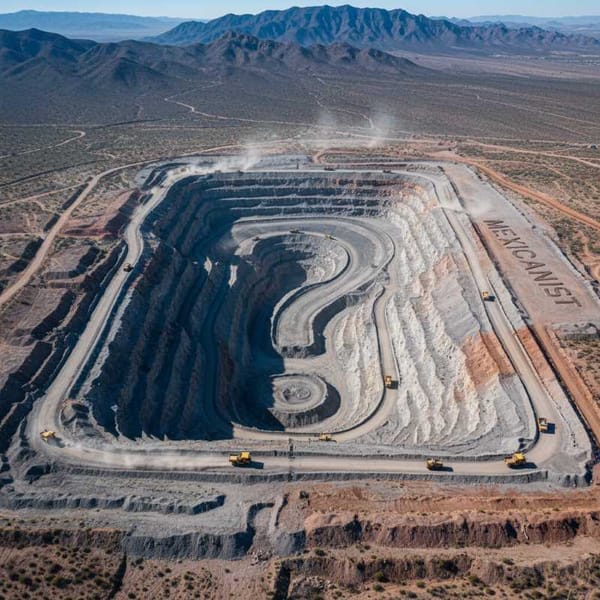Remaking Transport and Power Generation Key to Mexico's Green Shift
Mexico's energy is dominated by fossil fuel consumption within its own production and transport sectors, requiring a national strategy focused on efficiency, displacing natural gas with cleaner sources like nuclear, and transitioning transportation to electric to achieve a sustainable future.

More than half of Mexico's energy might is consumed not by homes or industry in the traditional sense, but within the very arteries of its energy sector itself – the production and processing of oil and gas, alongside electricity generation. This striking inefficiency, coupled with a deep-seated reliance on fossil fuels, presents both a formidable challenge and a significant opportunity as the nation contemplates a cleaner energy future, according to a prominent voice in Mexican energy circles.
Francisco Barnés de Castro, former rector of the National Autonomous University of Mexico (UNAM), recently addressing a centennial celebration for chemical engineering in Mexico, laid bare the country's energy predicament. He emphasized that the most fertile ground for reducing energy consumption and pivoting towards cleaner alternatives lies squarely within the operations of state-owned oil giant Petróleos Mexicanos (Pemex) and the strategic decision to cease burning fuel oil for electricity.
While acknowledging the significant consumption of liquid fuels in transportation, accounting for 85 percent of the total, Barnés de Castro argued that the heavy lifting for decarbonization must occur within the core energy infrastructure. "If we are going to decarbonize the country, the enormous areas of opportunity lie in Petróleos Mexicanos and in stopping the use of fuel oil in electricity generation," he stated.
A critical element of any forward-looking strategy, he warned, must be the planned displacement of natural gas in power generation. Failure to do so will only deepen Mexico's dependence on this increasingly imported energy source. While liquid fuels dominate transport, he suggested, tackling this sector requires focused government and societal support through concrete actions and public policy aimed at transitioning away from these fuels.
To provide the grid with the stable and reliable "firm capacity" it requires, Barnés de Castro advocated for an accelerated introduction of clean energy sources. Without this, natural gas is poised to remain the dominant force in the energy mix for years to come, potentially hindering emission reduction goals.
In a notable call to action, the former director of UNAM's Faculty of Chemistry urged the nation to confront the "taboo" surrounding nuclear energy. He proposed integrating nuclear power plants into a national strategy to supplant natural gas in the electricity sector, particularly as the anticipated shift towards electric transportation is expected to drive up power demand.
Beyond the generation and industrial sectors, Barnés de Castro also highlighted critical areas for energy transition in end-use consumption. He suggested prioritizing the promotion of public transportation over private vehicles, noting that even an inefficient public system is less demanding and polluting than the multitude of cars it replaces. Ideally, he added, this would involve accelerating the adoption of modern electric public transport.
Incentives are also crucial for encouraging the replacement of gasoline-powered private cars with hybrid or electric alternatives. For cargo transport, he recommended a shift to compressed or liquefied natural gas, citing their lower cost and reduced pollution compared to diesel, or exploring the potential of green hydrogen.
Mexico also faces significant challenges in the residential sector. Barnés de Castro pointed out that the country is the world's largest consumer of liquefied petroleum (LP) gas for domestic use. Furthermore, a substantial 30 percent of homes in communities with fewer than 50,000 inhabitants still rely on firewood, a practice contributing to deforestation and posing serious health risks due to toxic smoke.
Addressing these disparities is a clear commitment for the nation, he emphasized. Bringing more affordable electricity to underserved communities and educating residents on its productive uses, beyond basic lighting or powering a television, is essential. Providing access to gas is also vital to eliminate the reliance on firewood, paving the way for a more sustainable energy matrix across the country.
Analyzing the national energy balance, Barnés de Castro, who also previously served as director general of the Mexican Petroleum Institute, dispelled the notion that Mexico's economy is solely dependent on liquid fuels. He noted that the country's reliance has increasingly shifted towards natural gas, which, combined with imported dry gas, constituted 45 percent of the gross domestic supply in 2023. Crude oil, condensates, and liquid fuels accounted for a smaller 38 percent.
Delving into recent trends during the "Mexico's Energy Matrix and Challenges of the Energy Transition" plenary session, he highlighted a significant 110 percent increase in clean energy production between 2012 and 2023. The most substantial gains occurred in the last three years of that period, with solar power surging by 400 percent, wind by 200 percent, hydroelectric by 125 percent, and nuclear energy by 40 percent.
Despite this growth in clean energy, fossil fuels still represented a dominant 85 percent of energy generation and 88 percent of the gross domestic supply in 2023. Barnés de Castro also noted a fluctuating trend in fossil fuel consumption; while it decreased by 33 percent from 2012 to 2019 (with crude oil production falling 36 percent and natural gas production 28 percent), it subsequently increased by 16 percent from 2019 to 2022.
Given the persistent heavy dependence on fossil fuels and the growing prominence of natural gas imports, Barnés de Castro concluded that a comprehensive national energy transition plan is not just advisable, but essential. Such a plan, he argued, must encompass a long-term vision for achieving a sustainable energy mix, concrete actions to enhance efficiency in hydrocarbon operations, and deliberate strategies aimed at reducing the nation's reliance on natural gas – challenges that Mexico must confront in the years ahead.




